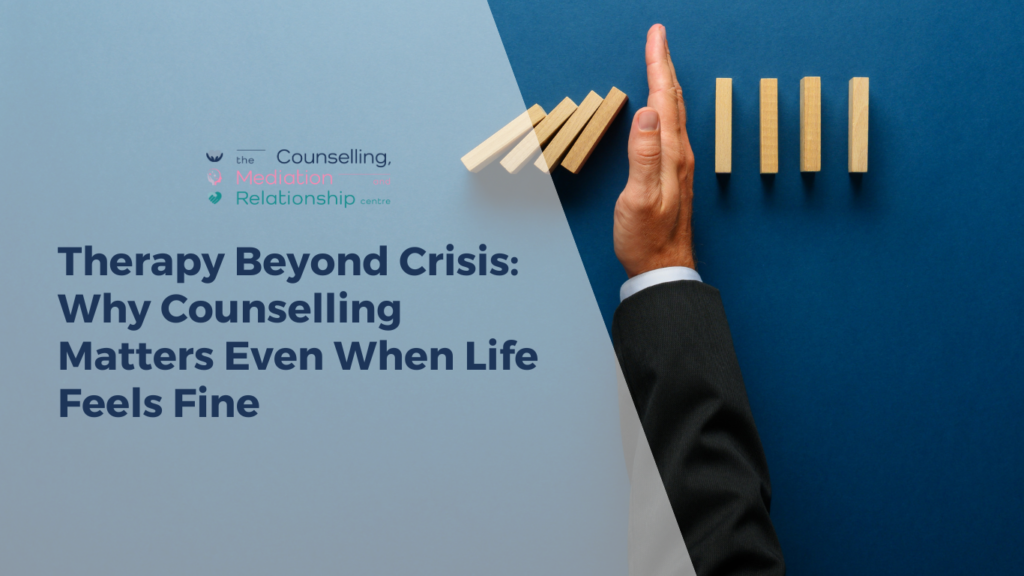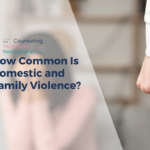Therapy Beyond Crisis: Why Counselling Matters Even When Life Feels Fine

Therapy Beyond Crisis: Why Counselling Matters Even When Life Feels Fine
Many people seek counselling when life feels unbearable. A loss, a breakup, or an overwhelming sense of anxiety pushes them to reach out for help. Yet not all distress is loud or dramatic. Sometimes, it’s a quiet sense of dissatisfaction a feeling that something isn’t working even when life looks okay from the outside.
You don’t have to wait for a crisis to benefit from therapy. Counselling can help you reflect, understand yourself better, and build stronger relationships. It’s a space where you can explore thoughts and feelings that might not fit neatly into a diagnosis, but still deserve attention.
Counselling Is Not Only for Crisis
Counselling is often associated with treating anxiety, depression, or trauma. While it can be essential for managing these, its value extends far beyond crisis support.
Many people now turn to counselling for:
- Building confidence and self-esteem
- Understanding emotions and reactions
- Improving communication and relationships
- Managing stress before it escalates
- Finding direction or purpose in life
The British Association for Counselling and Psychotherapy (BACP) reported in 2024 that over a third of clients sought counselling for self-esteem, confidence, and personal support not because of a mental health crisis. This shift shows a growing recognition of therapy as a proactive and practical step toward emotional well-being.
The Limitations of Waiting for Help
Public counselling services such as NHS Talking Therapies provide essential support for people experiencing anxiety or depression. However, access can be limited, and waiting lists can stretch for months.
For someone who wants to address personal growth, stress, or relationship concerns, this delay can make it harder to act when motivation is high. The longer you wait, the easier it becomes to convince yourself your issues aren’t serious enough.
Privately funded counselling provides more flexibility and immediate support. You choose your therapist, decide how often to meet, and set goals that match your needs. The therapy process becomes a partnership focused on your self-development, not a response to crisis.
The Value of Private Counselling
Private counselling offers more than convenience. It offers choice, privacy, and control over your mental health journey.
Many adults use therapy as a personal development tool, not a treatment.
Through regular counselling, you can:
- Develop emotional awareness and self-understanding
- Break unhelpful relationship or behaviour patterns
- Strengthen decision-making and problem-solving skills
- Build resilience and reduce emotional reactivity
- Create a healthier sense of self-worth
Your therapist provides a safe, non-judgmental environment to explore thoughts you might hesitate to share elsewhere. The focus is on growth, reflection, and empowerment not diagnosis.
Overcoming Common Barriers
One of the biggest barriers to therapy is the belief that you need to be struggling before seeking help. Many people feel guilty for wanting therapy when others “have it worse.” Others see therapy as a sign of weakness or failure.
This belief is outdated. Seeking therapy is not a sign of struggle it’s a sign of self-awareness and emotional maturity. Choosing to understand yourself better is one of the most responsible steps you can take for your well-being.
When you engage in counselling before a crisis, you often prevent bigger problems later. It allows you to build coping tools and clarity while you’re still functioning well.
Taking the First Step
Starting therapy can feel uncertain, especially if you’re unsure what you want to talk about. That’s completely normal. Your therapist doesn’t expect you to have all the answers.
You can begin with a general sense that something needs attention. It could be difficulty managing stress, repeating old patterns, or feeling unfulfilled despite success. A skilled counsellor will guide you to explore what’s behind those experiences and help you set realistic goals for growth.
Counselling is flexible. Some people attend for a few months to work on a specific issue, while others continue longer to deepen their understanding of themselves. The pace is yours to decide.
Why Therapy Is a Personal Investment
Therapy helps you build tools for life awareness, emotional balance, and resilience. These benefits go beyond managing problems. They improve how you relate to others, how you communicate, and how you respond to challenges.
You wouldn’t wait for a physical injury to learn about fitness. Mental health deserves the same attention. By seeing therapy as a personal investment rather than a reaction to crisis, you create long-term emotional health and a greater sense of peace.
Frequently Asked Questions (FAQs)
- Should I try therapy even if I don’t have a mental health diagnosis?
Yes. Many people attend therapy to learn about themselves, set goals, or improve relationships. You don’t need a diagnosis to benefit. - How will therapy help if I already feel okay?
Therapy can strengthen emotional skills, improve communication, and prevent small issues from becoming major problems later. - What can I talk about in counselling?
You can discuss anything from stress at work to relationship struggles, or simply feeling stuck. Therapy is a space to think and speak freely. - How long does counselling take?
It depends on your goals. Some clients prefer short-term therapy focused on one issue. Others choose ongoing sessions for deeper personal growth. - Is private counselling worth the cost?
Yes. Clients often describe therapy as one of the most valuable investments in their personal and emotional well-being. - What if I don’t know how to start?
Your counsellor will guide the conversation. All you need is openness and a willingness to reflect on your experiences.
Key Insight:
You don’t need to wait until things fall apart to seek help. Counselling provides a supportive space for growth, reflection, and better understanding of yourself. Whether you’re facing challenges or simply want to improve your emotional health, therapy can be a practical and powerful step forward.
Book an Appointment
📍 Visit us at: Shop 2/44 Ulong St, Griffith NSW 2680
📧 Email: donna@griffithcounselling.com
Take the first step toward caring for your well-being today. Reach out to schedule an appointment and begin your journey to a more balanced, fulfilling life.

 Previous Post
Previous Post